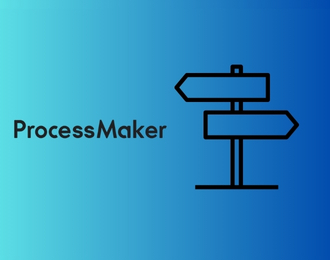After recently attending the SMMT Connected event in London last month it was no surprise that the adoption and implementation of digital transformation in the automotive industry continues to move at snail's speed. The industry in general is awash with many internal and external challenges.
A Forrester case study (‘How Robins & Day Applied the Privateer Model for Low–Code Citizen Development') talks about the 30-plus systems that it takes to sell a car.
With so many manual processes on top of all the industry challenges it is understandable that the senior leaders at auto dealerships and auto manufacturers are finding it difficult to get time to take a step back and assess what is required to move the needle. Identifying what and how to continually improve is no mean feat but we have done the hard work for you and compiled five key trends that will support the success of your digitalization journey.
What is Digital Transformation in the Automotive Industry?
Digital transformation in the automotive industry refers to rethinking how things get done by leveraging technology to work smarter. It’s not necessarily about overhauling everything but rather identifying repetitive, manual tasks that can be streamlined with digital process automation tools.
The result? A smoother workflow that benefits everyone, from employees at auto dealerships to those on the manufacturing floor.
I always advise clients to start small, get a few onerous processes automated successfully initially, and then scale. When you start to reap the benefits of the pilot automated processes digital transformation often naturally follows.
Each department within the organization wants and needs to work smarter. Good news tends to travel fast and individual teams want a piece of the action. Successful deployment often fosters an innovative culture and an appetite for digital transformation in the automotive industry ensues.
Still curious about digital transformation in the automotive industry? Watch this recent webinar where we share insights into the key trends disrupting the automotive industry in 2025.
Interested in learning more? Download our latest eBook to discover how automotive organizations are staying ahead of the competition and economy by implementing digitalized processes across all areas of their business.
Benefits of Digital Transformation in the Automotive Industry
Digital transformation is reshaping the automotive sector, bringing practical, people-focused improvements. Here’s how:
- Streamlined Operations: Automating tasks like inventory management and HR processes reduces time-consuming manual work, allowing employees to focus on more impactful projects.
- Enhanced Decision-Making: Real-time data and analytics provide insights to fine-tune production schedules, predict market trends, and deliver better customer experiences.
- Improved Efficiency: Processes such as quality checks and customer service become faster and more reliable, ensuring smoother workflows across departments.
- Customer-Centric Solutions: With digital tools, dealerships can provide personalized recommendations and faster service, boosting customer satisfaction.
By making everyday tasks simpler and more efficient, digital transformation doesn’t just optimize workflows—it also empowers teams to work smarter, not harder.
Challenges of Digital Transformation in the Automotive Industry
While the potential is enormous, embracing digital transformation comes with its share of hurdles:
- Economic Uncertainty: Fluctuating market conditions and rising costs can make it hard to prioritize digital investments.
- Sustainability Goals: Transitioning to greener models, like EV production, often requires massive overhauls in processes and supply chains.
- Employee Adoption: Change can be intimidating—training and engaging teams to embrace new systems is essential but often challenging.
- Legacy System Integration: Combining cutting-edge tools with older, established systems can create roadblocks, requiring careful planning and investment.
Facing these challenges head-on, with clear goals and strong leadership, ensures businesses can make the most of their digital transformation efforts.
Use Cases of Digital Transformation in The Automotive Industry
- HR Processes - Onboarding/Offboarding; Resource Authorization; Job Application; Employee Eligibility; Training; Appraisals; Holiday Requests
- Sales Processes - Cost authorization; vehicle appraisals; online car entry/removal; stock transfer; bonus on vehicle
- Health & Safety - Daily checks of tools; building management maintenance; wheel alignment checks; alarm & fire safety checks
- Service - Pre-service recall checks; WIP archiving; digitalizing job cards; customer onboarding; customer communications
- Finance - Invoicing prep; purchase ledger; resource approvals; loan audit trail
5 Key Trends in Digital Transformation in The Automotive Industry
 1. Digital Transformation of Legacy Systems
1. Digital Transformation of Legacy Systems
Let's look at the car dealership initially. When I talk to conference delegates and clients the main obstacle tends to be linked to the plethora of legacy systems, manual process flows, and customer journeys (dealer management systems, apps, websites, in-person conversations, telephone calls) on top of PAPER!
It is startling how many dealerships still hold vehicle details in lever arch files, relying on individuals from different departments (not to mention geographic locations) to keep those records updated manually.
This is untenable when it is a large dealership spread over numerous locations. It is imperative to have digital records for customers, potential customers, and employees so that that information is accessible in real time to those who need it.
If we switch to the car manufacturer, while many know they need digitalization in the automotive industry, many continue to be under digitalized with lots of processes across the factory floor still being managed manually on paper resulting in inconsistencies, and sub-optimal customer and employee experiences.
 2. Digital Transformation in The Automotive Industry for Improved Consistency
2. Digital Transformation in The Automotive Industry for Improved Consistency
Inconsistent processes make a dealership look unprofessional. Customers understandably are perplexed especially when processes involving car servicing or warranty recalls (a revenue stream that is becoming as important as the car sale), are poor.
When employees must touch/interact with so many different systems to sell a car, consistency is key, and even more so when a dealership has multiple geographic locations.
Because a car purchase is such a significant investment, customers expect slick seamless processes from the minute they express an interest online or in person to the decision to purchase, the handover of keys, right through to the aftersales experience.
When dropping their vehicle off for a service they will have likely taken time out of their schedule or even taken a day off work so it’s key to avoid any hiccups in advance (i.e. check for parts, a change in scheduling, courtesy car availability) to ensure a smooth engagement and repeat business.
If some communication is via the website, they expect that experience to transition to the service desk, and filter through to the marketing department, so that communications are timely and accurate.
Processes span across every department in any organization. It makes sense to ensure that all processes are consistent, optimized, and digital where possible especially when margins are tight. This is where digital transformation in the automotive industry can be extremely powerful demonstrating a level of sophistication that aligns with customer expectations and sets you apart from your competition.
 3. Real-Time Data Analytics in Automotive
3. Real-Time Data Analytics in Automotive
I recently got a real-life understanding of the senior management challenges during a meeting with a dealership grappling with digitalization.
The Managing Director said ‘I just need instant transparency, that one pane of information that I can drill into. I don’t have time to run or wait on reports, export files, and apply pivot tables. I need the granularity and analytics at the touch of a button, and preferably across all dealerships’. This struck a chord. Is requesting, running, and analyzing reports a good use of anyone’s time, never mind someone in a senior position? Surely not.
Dashboards and real-time information at a departmental level are as essential to senior leaders in this sector as a car lift is to service engineers in the garage. The ability to have instant access to how many cars are on the forecourt, how long each has been there, how many are in transit, and how many are overdue from the manufacturer while simultaneously being able to analyze HR and or Finance process bottlenecks is essential. Without real-time data, it is impossible to see the full picture.
Imagine a customer who has ordered a new top-of-the-range car. The order was placed 3 months ago but the hold-up is with the manufacturer. The customer is understandably eager to receive their new vehicle and regularly calls the dealership for an update.
If that dealership does not have a digitalized process in place that details each communication relating to that sale the dealership risks looking unprofessional to the client who understandably gets more and more annoyed the longer they have to wait.
A consistent process that tracks where exactly a vehicle is at any given point in time allows anyone at any dealership to quickly identify the status and escalate bottlenecks when appropriate.
Having information available at the click of a button facilitates timely data-driven decision-making and quick identification of problem areas that need to be prioritized.
Digital transformation in the automotive industry means that simple and complex processes across the entire organization can be automated. The detail is always in the data but if the data is recorded manually on paper or within email and spreadsheets or many of your legacy systems it is impossible to have the much-needed real-time accuracy that an organization craves to be efficient, productive, and meet the needs of their internal and external customers.
 4. No Code Platform for Automotive
4. No Code Platform for Automotive
The term digital transformation can have negative connotations and instill a sense of fear with senior management under pressure to bring their systems and processes up to speed.
The term suggests a rip-and-replace strategy in terms of systems, solutions, and sometimes personnel however with the right solution this could not be further from the truth.
IT personnel can be difficult to source and budget for if margins are tight, but you do not need highly experienced IT specialists to achieve digital transformation in the automotive industry. With a no code digital process automation solution the business users at the manufacturer site or car dealership are empowered to create their own processes which helps to drive that innovative culture required to step-up any digital strategy. No one knows the processes that need to be digitalized better than those who live and breathe the manual tasks day in and day out.
Often there will be someone in the organization who is driving a digitalization project. Whether they have shown an interest, or been delegated that task, they will want to ensure that they have the right group of people with the right skills to bring their vision to fruition, but expensive resources are a myth when anyone can create and implement their own digital workflows.
IT managers will still want to govern the rollout of such a project but being able to delegate the design and implementation phases to any process owner is hugely attractive when there is lots of work to be done.
 5. Electric and Autonomous Vehicles Are Changing the Face of The Industry
5. Electric and Autonomous Vehicles Are Changing the Face of The Industry
Vehicle manufacturers and dealerships are also mindful of the changing face of the industry in general. The imminent electrification of vehicles and the estimated increase (33 million) in autonomous vehicles on the road by 2040 changes the landscape considerably.
Managing and planning for what is to come while simultaneously keeping the lights on in the traditional business model is undeniably a challenge and something that affects all areas of the organization.
Changing customer preferences will also play a part in the transition from internal combustion engines to zero-emission vehicles. McKinsey analysis reports that global EV sales are growing at 80% year on year since 2020. This will inevitably affect the aftersales and servicing models in the industry longer term, not to mention the skill sets required.
Bloomberg New Energy Finance expects EVs to account for 10% of all new car sales by 2025 and 58% by 2040. Interest in hybrid technology also continues to outstrip full battery electric vehicles (BEVs) in most countries except China.
The power of process automation in automotive will pick up pace as the industry and customer expectations/preferences change.
Once Digitalized It’s a Smooth Ride
For an industry that is renowned for being digitalized once organizations take that leap of faith, there is no turning back. It’s almost akin to switching from a manual car to an automatic. Any fears/reservations about change are quickly forgotten. One of our clients has digitalized over 500 processes since implementing our no code process automation tool.
There has been a seismic shift in productivity, employee culture, and satisfaction. Gone are the paper and lever arch file days, and the lengthy time that it takes to unravel the history of specific processes. Everyone is finally singing from the same hymn sheet and the consistency across all departments in all locations is much welcomed.
 From a senior leadership perspective, the rewards are two-fold. From a business standpoint, there is the obvious win in terms of streamlined digitalized processes, and operational efficiencies which impact the bottom line.
From a senior leadership perspective, the rewards are two-fold. From a business standpoint, there is the obvious win in terms of streamlined digitalized processes, and operational efficiencies which impact the bottom line.
The intangible benefits, however, are priceless – empowered employees who can confidently create their own digitalized workflows and effect change. To see employees excited and inspired about how they can make a difference across multiple departments makes a huge difference to staff morale and productivity across the entire organization.
The agile approach of the FlowForma Process Automation (integrating forms, workflow, analytics, and document generation) no code tool means that anyone in the organization can create a digitalized workflow to enhance a process.
There are out-of-the-box templates for common processes that help get started. Templates can be used like a cookie cutter and steps can be tweaked for other processes. This is good when trying to pilot a simple process first. The beauty then is as users become more familiar with and confident creating and implementing their digitalized processes, the appetite to create new workflows is almost contagious and soon there is good healthy cross-department competition.
If you are interested in finding out more, contact our automotive process team today to schedule your no-obligation demo or start your free trial. We can’t wait to share some exciting customer use cases to inspire digitalization in the automotive industry.
.png) By
By 




